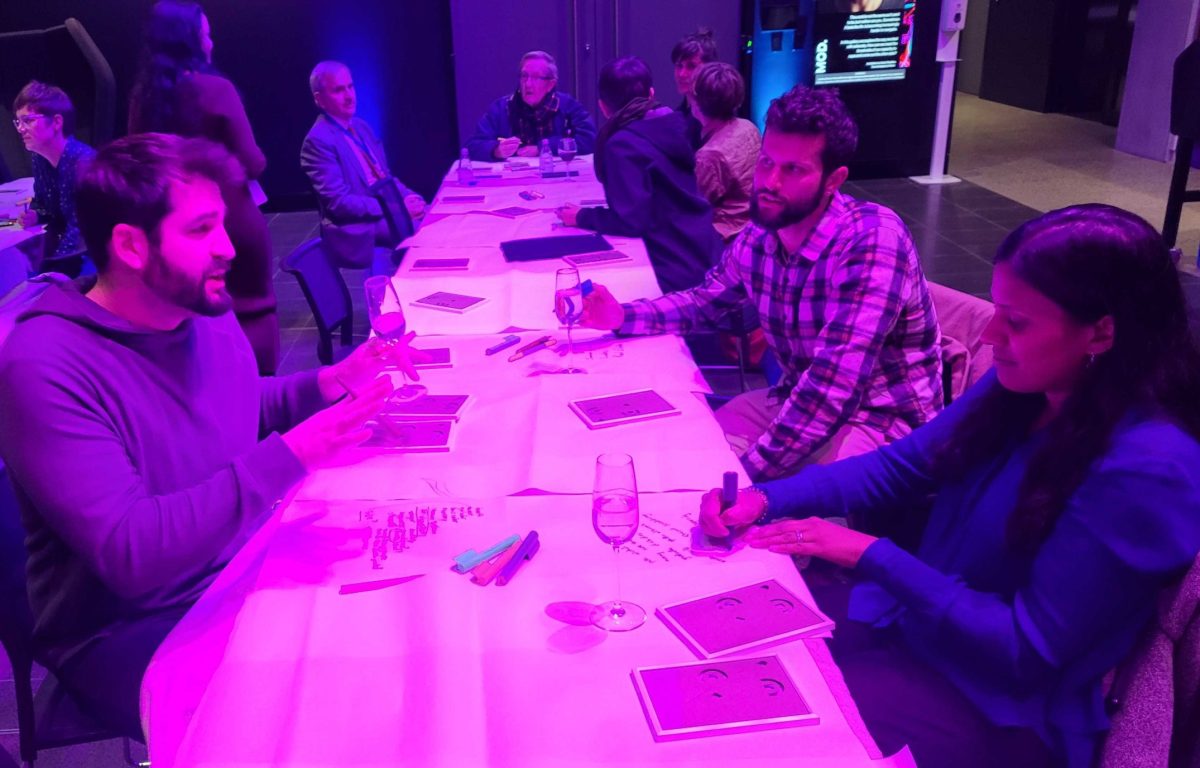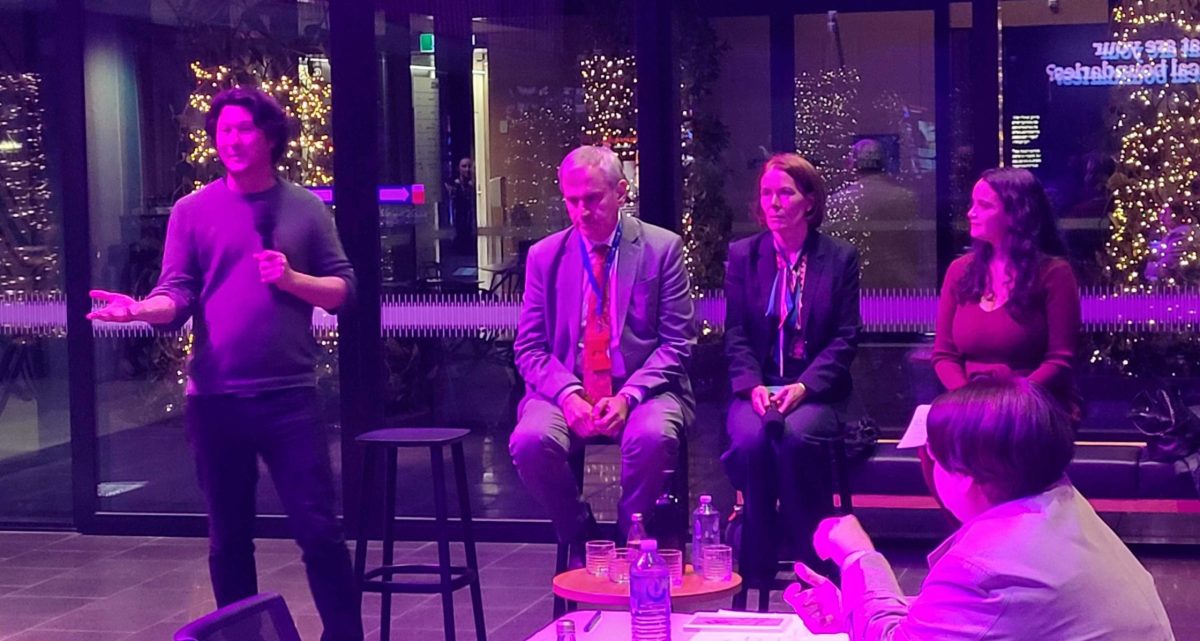Posted 2 Jun

MOD. hosted its second Ethos event of the year in May to discuss the million dollar question: should you be able to inherit wealth? May’s event considered the ethics of inheriting wealth including questions about equitable distribution of inheritance more broadly. Ethos aims to foster a culture of ethical questioning amongst students, researchers, and the public.
The evening kicked off with an activity facilitated by host Dr. Debbie Devis. Guests were asked to create a list of all the things they could inherit, choose their top three, and frame them in provided photo frames. So, what did we discover? Results from the activity showed that while there were some common desires among the group, there was a surprising amount of diversity too. Let’s be honest, most of us desire to inherit money or wealth of some form one day… right? Well, that wasn’t the case for everyone. Some of our guests opted for their parents good looks, health, and IQ over money all together!
Amongst our group of guests, researchers, and students a range of possible inherited items were highlighted. For example, one of our guests added that family secrets could be inherited, suggesting that a family secret could hold more value than any amount of wealth. On the whole, inheritance means something different to everyone. Therefore, discussions around the ethics of inheriting wealth can be quite tricky. Devis asked PhD Candidate Richie Khoo, Professor Vicki Wayne, and Professor Andrew Beer to delve deeper into the ethics of inheriting wealth. After the discussion panel provided our guests with some stimulating prompts for group conversation we shared our thoughts about these ethical questions and insights.

So, why should we change the way we think about inheritance? Professor Andrew Beer gives us some insight by leading a conversation about the social function and importance of inheritance. For Beer, inheritance can perform as an emotional connection to family and culture. This is demonstrated through an example from his late wife, who inherited a ring from her mother which once belonged to her great grandmother. Beer tells us that not only does inheritance serve as an emotional connection to family, it keeps us connected to our culture and family history too. If the ethics of inheritance changes, will this alter the social function and importance of inheritance too?
While inheritance plays an important social and emotional role, it also performs other functions in society and particularly in the economy as a form of property rights. Beer continues the conversation by introducing inherited property as an expression of our right to pass on property to our loved ones after we have passed. Similarly to the example Beer shared from his late wife, you could consider inheriting a house in the same regard. One of our guests adding that passing down a house to your children one day creates a positive impact on their lives, and leaves you with a sense of security. Therefore, we can see a merging boundary between property rights, and the social and emotional function of inheritance.
However, as stressed by Beer, once we begin to question the ethics of property rights we begin to question where the boundaries lie. Conversely, the gift of property or wealth would alleviate stress for those experiencing hardship in the current cost of living and housing crisis in Australia. Some of our guests agreed that they are unfortunately “waiting for their parents to pass on until they become homeowners”, due to the current housing market. On the contrary, as the demographic in Australia changes, life expectancy increases and therefore most people are not receiving their inheritance until they are well into their 50’s, 60’s or even 70’s. As a result, it was suggested that our loved ones should enjoy their wealth for themselves, or donate their estate to charity once they have passed on. If so, then could there be a more sustainable and ethical way to distribute our inheritance?
Professor Vicki Wayne introduces us to the current models of law in Australia about our inheritance. Additionally, she informs us that there are currently no inheritance or estate taxes in Australia suggesting that “the rich get richer” and the middle and lower class deal with the repercussions. This brought on conversations about “taxing the rich”, and it seemed that most of our guests were for it. Did you know Australia used to have an inheritance tax? Australia’s income tax was abolished in the late 70’s by Prime Minister Malcom Fraser, and we are now one of the many countries who do not tax on inheritance. So, could re-introducing the inheritance tax ethically improve how we inherit wealth?
Consider this, if we re-introduce an inheritance tax in Australia we subsequently generate more income for the government, this could lessen income tax. Considering that tax is not paid on large inheritance, the re-introduction of inheritance tax could introduce greater equity across a wider range of people.
However, Wayne mentions that the inequity in tax free inheritance is somewhat countered through government initiatives. This is illustrated through almost free healthcare and low cost education.

So what possible ethical solutions exist for the issue of inheriting wealth? Furthermore, who decides which solutions benefit a range of people in ethical and equitable ways? PhD candidate Richie Khoo introduces us to his research at UniSA. Khoo currently researches Co-Designing embodied data experiences for complex social transitions. Where communities who are experiencing challenging transitions exist, there is often an overwhelming amount of data on how to cope. As a result, decisions are often based on digitalised grouping and the preferences of political bodies. Khoo’s research looks into the possibility of utilising our innate grouping skills to find solutions. These co-designed solutions could keep the best interest of wider communities at heart.
Khoo demonstrated for us that these co-designed solutions could function as a useful tool for thinking about ethical change, especially when it comes to inheritance. For example, imagine if our guests represented each dollar they could inherit with a grain of rice. Suddenly, the entire room would be able to physically see the “data” or money available much easier. (What a big pile of rice that would be!)
For Khoo, communities can move through big challenges easier when we “bring the data into the room” and utilise collaborative practices. If our governing bodies presented data to us in more transparent and accessible ways like Khoo has demonstrated, ethical issues could be easier to navigate.
As mentioned by one of our guests, demographics are changing. Therefore, you are more likely to gain inheritance later in life, and subsequently the purpose of inheritance is changing. Considering this, we discussed how individuals who are obtaining large amounts of inheritance could negatively affect communities.
For example, one might decide to use their inheritance to destroy nature in favour of building property. Highlighting that perhaps there are improvements to be made in terms of how inheritance is gained and distributed. Should there be more parameters placed on inheritance?
As mentioned by one of our guests, “inheritance is personal and can foster surprising, sometimes damaging outcomes.” Is a call to action needed for our political bodies to involve communities in the ethics of inheriting wealth?
Ethos is made possible with funding through the Deputy Vice Chancellor of Research and Enterprise. We hold Ethos events regularly and MOD., you can find more details here.
Renée Pastore was the rapporteur for this event and is a moderator at MOD.